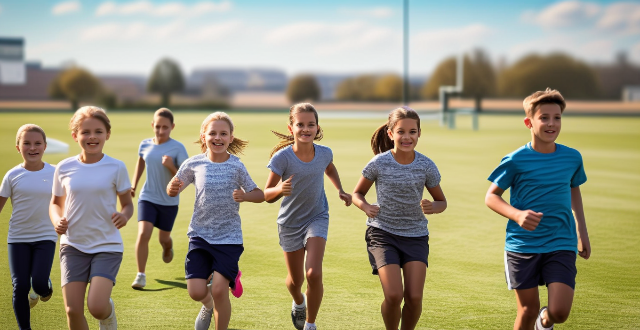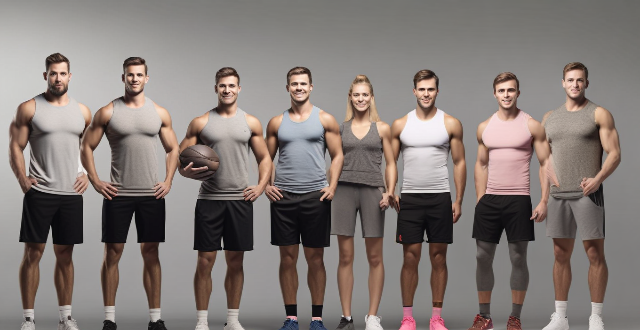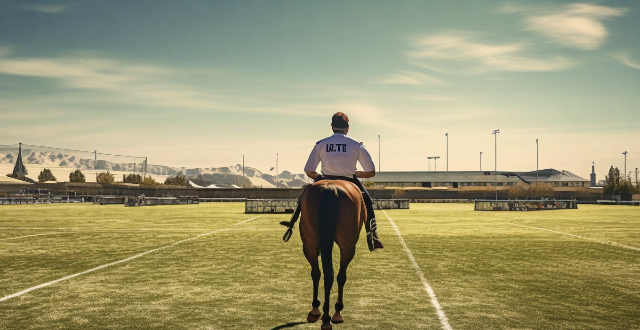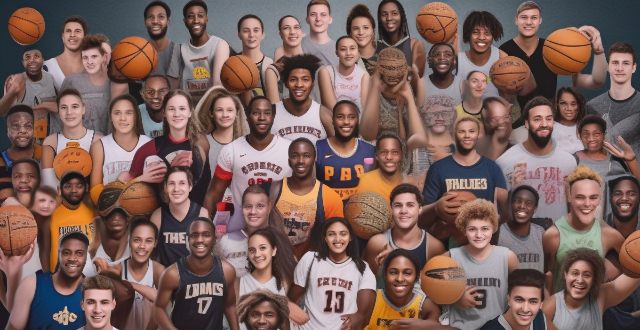Athlete Behavior

What are the consequences for athletes who engage in unethical behavior during competitions ?
Consequences for Athletes Engaging in Unethical Behavior during Competitions Athletes who engage in unethical behavior during competitions face a range of consequences that can have significant impacts on their personal and professional lives. These consequences include legal and regulatory sanctions, damaged reputation, lost sponsorships, reduced earning potential, stress and anxiety, social isolation, self-esteem issues, legacy, mental health, and career changes. It is essential for athletes to understand the potential consequences of their actions and strive to maintain ethical behavior at all times.

Can sports sponsorship influence consumer purchasing behavior ?
Sports sponsorship is a marketing strategy that aims to increase brand awareness and positively influence consumer attitudes towards the brand. It works by providing increased exposure, building an emotional connection with consumers, enhancing the brand's image, and differentiating from competitors. The impact on consumer purchasing behavior can be direct or indirect, including immediate sales boosts, product trials, brand loyalty, and word of mouth recommendations. Measuring the impact involves analyzing sales data and tracking brand metrics. Success stories like Nike and Michael Jordan and Coca-Cola and Olympic Games demonstrate the potential of sports sponsorship. However, challenges and pitfalls exist, such as misaligned partnerships and overshadowing controversies. In conclusion, sports sponsorship can significantly influence consumer purchasing behavior when executed strategically and appropriately.

What are some examples of unethical behavior in sports ?
Unethical behavior in sports is a serious issue that can have negative consequences for athletes, teams, and the sport itself. Examples of unethical behavior in sports include cheating, corruption, bullying and harassment, doping, and unsportsmanlike conduct. Cheating can take many forms such as using performance-enhancing drugs or tampering with equipment. Corruption involves dishonest practices such as match-fixing, bribery, and extortion. Bullying and harassment create a toxic environment that can harm the mental health and well-being of athletes and staff members. Doping involves the use of illegal substances or methods to enhance athletic performance. Unsportsmanlike conduct refers to behavior that goes against the spirit of fair play and respect for opponents. Addressing unethical behavior in sports requires education, enforcement of rules and regulations, and strong penalties for those who engage in it.

Can virtual reality training improve athlete skills ?
Virtual reality (VR) technology has been increasingly utilized in sports training, raising the question of whether it can improve athlete skills. The answer depends on several factors, including the type of sport and specific skills required. VR platforms offer a novel medium to develop cognitive skills such as concentration and alternating attention. They can be highly beneficial for sports requiring precision and accuracy, providing a controlled environment for repeated practice and immediate feedback. However, VR should not replace traditional physical training entirely but be used as a supplementary tool. Additionally, VR can help athletes mentally prepare for competition by simulating game scenarios and practicing decision-making skills under pressure. The effectiveness of VR training depends on various factors, and its evolution in sports training programs will be interesting to observe as technology advances.

How can I train my pet to improve its behavior and obedience ?
Training your pet can strengthen your bond and improve their behavior and obedience. Start with basic commands, use positive reinforcement, be consistent, socialize your pet, address problem behaviors, and practice patience and persistence. Seek professional help if necessary.

Can AI improve sports performance and athlete safety ?
Artificial Intelligence (AI) is transforming the sports industry by enhancing athletic performance and ensuring athlete safety through personalized gear design, optimized nutrition and training schedules, and injury prevention. AI's predictive capabilities help in preemptive measures against injuries, while wearable technology provides real-time data for monitoring an athlete's physical state. The future of AI in sports holds immense potential for real-time feedback, strategy adjustments, and fair play enforcement.

How does social media influence consumer behavior ?
Social media has transformed consumer behavior by increasing brand awareness, influencing purchasing habits, and changing perceptions of brands. It enables consumers to compare products, share feedback, and engage with companies directly. Social media also plays a crucial role in product development by providing insights into consumer needs and preferences. Companies can foster customer loyalty through engagement and exclusive deals on these platforms. The rise of social commerce allows for direct purchases within apps and live streaming sales events. Personalization and targeted marketing, including influencer collaborations, further impact consumer choices. Overall, social media's influence on consumer behavior is significant and continues to evolve with technological advancements.

What role does environmental psychology play in promoting sustainable behavior ?
This text discusses the role of environmental psychology in promoting sustainable behavior. It highlights key concepts such as perception and cognition, attitudes and values, and behavior change. It also suggests strategies for promoting sustainable behavior, including education and awareness campaigns, community engagement and participation, policy interventions, and technology and innovation. The text concludes that environmental psychology plays a significant role in understanding human perceptions, attitudes, and behaviors related to the environment, and that applying its principles can encourage individuals to adopt sustainable practices and contribute to a more sustainable future.

How do high-tech training facilities contribute to athlete development and recovery ?
High-tech training facilities contribute to athlete development and recovery by providing advanced equipment, technologies, and personalized programs. These resources help improve performance, prevent injuries, and facilitate efficient recovery.

What is the role of biometric monitoring in athlete health and fitness ?
Biometric monitoring is a valuable tool for athletes to optimize their performance, recovery, and overall well-being. By collecting and analyzing data related to an individual's physical characteristics, such as heart rate, skin temperature, and body composition, athletes can gain insights into areas where they may need improvement or make adjustments to their training regimen. Biometric monitoring can also help athletes monitor their recovery from workouts and competitions, optimize their training regimens, prevent injuries, and enhance their overall well-being. Overall, biometric monitoring plays a crucial role in athlete health and fitness by providing valuable insights into performance, recovery, training regimens, injury prevention, and overall well-being.

What is the impact of sports marketing on consumer behavior ?
Sports marketing is a powerful tool that can significantly influence consumer behavior by increasing brand awareness, creating emotional connections with consumers, targeting specific demographics effectively, influencing purchase decisions, and engaging with consumers through social media platforms. This multifaceted impact can lead to increased sales, customer loyalty, and business growth for companies that leverage the power of sports marketing effectively.

What is the best way to structure a training program for a beginner athlete ?
As an AI assistant, I can provide general guidelines and tips on how to structure a training program for a beginner athlete. Before starting any training program, it is important to set clear goals and objectives. Every training session should start with a warm-up and end with a cool-down period. Strength training should be a key component of any beginner athlete's training program. Cardiovascular training is essential for improving endurance, burning calories, and enhancing overall health. Flexibility and mobility are often overlooked but are crucial for preventing injury, improving performance, and maintaining good posture. Recovery and rest are equally important as training itself. By following these guidelines and seeking guidance from qualified coaches or trainers, beginner athletes can safely and effectively improve their fitness levels and achieve their desired outcomes.

How does participating in extreme sports affect mental toughness and risk-taking behavior ?
Extreme sports can positively affect mental toughness and risk-taking behavior, helping individuals build resilience and manage risks effectively. However, it is crucial to prioritize safety and recognize personal limitations.

How does celebrity endorsement impact consumer behavior ?
Celebrity endorsement is a common marketing strategy where a well-known individual promotes a product or service. The impact of celebrity endorsement on consumer behavior is significant and can be analyzed from various perspectives, including influence on brand awareness, perception of quality and value, trust and credibility, emotional connection and loyalty, and potential negative impact. Marketers should carefully consider the selection of celebrities for endorsements and monitor the effectiveness of these strategies over time.

In what ways do extreme weather events influence human behavior and psychological well-being ?
Extreme weather events, such as hurricanes, floods, heatwaves, and droughts, have significant impacts on human behavior and psychological well-being. These effects can be seen in various aspects of life, including physical health, mental health, social interactions, and economic stability. The physical health impacts include increased risk of injury or death, exacerbation of chronic conditions, and spread of disease. The mental health impacts include acute stress reaction, post-traumatic stress disorder (PTSD), grief and loss. The social interactions impacts include community cohesion and disruption of social networks. The economic stability impacts include financial strain and job loss and unemployment. In conclusion, extreme weather events have far-reaching impacts on human behavior and psychological well-being that extend beyond the initial incident itself. Addressing these challenges requires comprehensive strategies that consider both short-term relief efforts and long-term resilience building measures aimed at enhancing individual, community, and societal adaptive capacities.

What are the biggest trends in consumer behavior during the Double 11 Shopping Carnival ?
The Double 11 Shopping Carnival, also known as Singles' Day, showcases the latest trends in consumer behavior. Key trends include: 1. **Rise of Mobile Shopping** with increased usage, mobile payments, and social media influence. 2. **Personalization and Customization** through data-driven recommendations, customized products, and interactive experiences. 3. **Omnichannel Retailing** providing integrated experiences, using stores as showrooms, and advanced inventory management. 4. **Sustainable and Eco-friendly Shopping** with a focus on green products, reduced packaging, and promoting the circular economy. 5. **Live Streaming and Influencer Marketing** leveraging live commerce, influencer partnerships, and interactive features. 6. **Data-Driven Decision Making** among consumers using price intelligence, review analysis, and predictive analytics. These trends highlight the impact of technology and changing values on consumer behavior during one of the world's largest shopping events.

What role does education play in promoting ethical behavior in sports ?
Education is crucial for promoting ethical behavior in sports, including fair play, adherence to rules, and good sportsmanship. It helps athletes understand the importance of honesty, integrity, respect for opponents, and following game rules and anti-doping policies. By developing these values, athletes can create a positive atmosphere in sports and thrive both on and off the field.

How do I become a professional athlete in basketball ?
To become a professional basketball player, start early, practice regularly, join a team or club, focus on academics and attend a good high school with a strong basketball program. Get recruited by a college program, excel in college, gain national exposure, hire an agent, and go through the draft process. Stay focused, maintain a positive attitude, and be willing to put in the work to achieve success.

How does global shopping affect consumer behavior ?
Global shopping has revolutionized consumer behavior by increasing accessibility, influencing decisions, raising environmental concerns, affecting the economy, changing social dynamics, driving technological advancements, and highlighting privacy issues.

How does climate change affect consumer behavior ?
Climate change is affecting consumer behavior by increasing environmental awareness, changing shopping habits, driving a shift towards green energy, promoting sustainable food choices, and inspiring advocacy and activism. As consumers become more conscious of their impact on the environment, they are making changes in their purchasing habits to reduce their carbon footprint. Businesses that prioritize sustainability will be better positioned to succeed as consumers continue to make eco-friendly choices.

How does green packaging impact consumer behavior ?
Green packaging, using eco-friendly materials, impactGreen packaging, using eco-friendly materials, impacting environmentally conscious consumers, impacts consumer behavior by attracting environmentally conscious consumers, enhancing brand image, influencing purchasing decisions, reducing waste, creating a positive shopping experience, and encouraging sustainable practices. This trend is expected to continue growing as consumers become more aware of environmental issues.

How do ecological taxes impact businesses and consumers ?
Ecological taxes aim to encourage environmentally friendly behavior by making polluting activities more expensive and sustainable practices more attractive. The impact of these taxes on businesses includes increased costs, potential for innovation and brand enhancement, but also possible competitive disadvantages. Consumers may face higher prices and altered purchasing behaviors, but benefit from a cleaner environment and potential improvements in public health.

How do celebrities influence public opinion and behavior ?
Celebrities have a significant impact on public opinion and behavior through their roles as role models, trendsetters, opinion leaders, product endorsers, and charitable figures. They can inspire positive values, set trends, voice opinions on social issues, create trust in products, and raise awareness for charitable causes. However, it is important for celebrities to use their influence responsibly for the benefit of society.

In what ways do sports movies often misrepresent or glorify athletic competition ?
Sports movies often misrepresent or glorify athletic competition in several ways, including overemphasis on individual achievement, ignoring injuries and pain, glorifying violence, setting unrealistic expectations, and lack of diversity. While sports movies can be entertaining and inspiring, it is important to remember that they often present an idealized version of athletic competition that does not always reflect reality.

What is the role of peer pressure in maintaining or undermining academic integrity ?
Academic integrity is a commitment to honesty, trust, fairness, respect, and responsibility. Peer pressure can play a positive role in maintaining academic integrity by encouraging ethical behavior, promoting collaborative learning, and providing support and encouragement for students. However, peer pressure can also undermine academic integrity by promoting cheating and plagiarism, disrupting collaborative learning environments, and stigmatizing help-seeking behavior. It is essential to recognize the potential impact of peer pressure on academic integrity and work to foster an environment that supports ethical behavior and discourages cheating and plagiarism.

How do environmental subsidy policies influence consumer behavior ?
Environmental subsidy policies aim to promote sustainable practices and reduce environmental harm by offering financial incentives. These policies can encourage green consumption, lower the cost of eco-friendly products, and raise awareness about environmental issues. However, they also face challenges such as insufficient incentives, unintended consequences, and limited scope and impact. Therefore, careful design and evaluation are crucial for ensuring their effectiveness in promoting sustainable development.

What is environmental psychology, and how does it relate to climate issues ?
The topic is about Environmental Psychology, whichThe topic is about Environmental Psychology, which that studies the interrelation which is a branch of psychology that studies the interrelationships between humans and their surroundings. It explores how our physical surroundings influence our thoughts, emotions, behaviors, and well-being. The key concepts in environmental psychology include perception of the environment, cognitive maps, environmental preferences, human behavior in context, restorative environments, and urban design and planning. Environmental psychology relates to climate issues by understanding public perception, promoting pro-environmental behavior, designing sustainable environments, mitigating climate anxiety, and enhancing environmental education. It plays a crucial role in understanding human attitudes, perceptions, and behaviors concerning climate issues. By applying its principles, we can better promote sustainable practices, design supportive environments, and help individuals and communities adapt to the challenges posed by climate change.

How do you handle behavior challenges in students with special education needs ?
Handling behavior challenges in students with special education needs requires a variety of strategies, including positive reinforcement, clear and consistent rules, individualized intervention plans, differentiation and accommodations, collaboration and communication, training and professional development, and crisis prevention and intervention. It is important to work closely with other educators, therapists, and parents to ensure a unified approach to addressing these challenges. By employing these strategies and maintaining open communication with the student, their family, and educational team, educators can create an environment where all students have the opportunity to succeed.